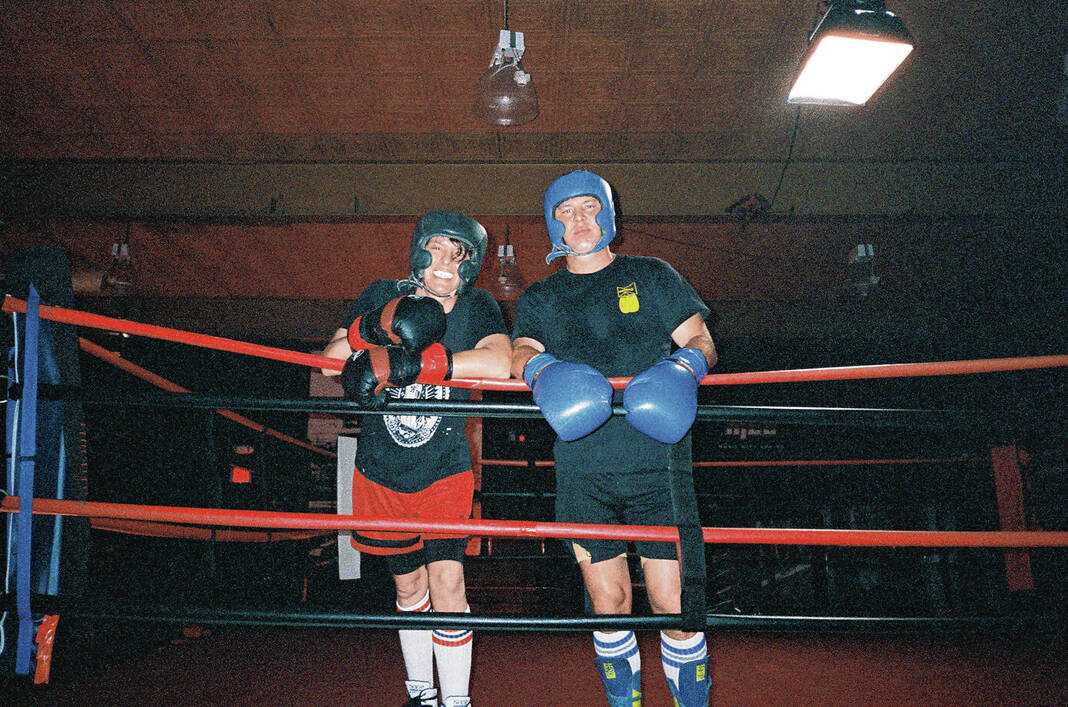
Stephen Wilson Jr., left, and his brother, Nic Wilson, got back in the boxing ring while shooting the music video for Stephen’s new song, “Father’s Son.”
Photo by Acacia Evans
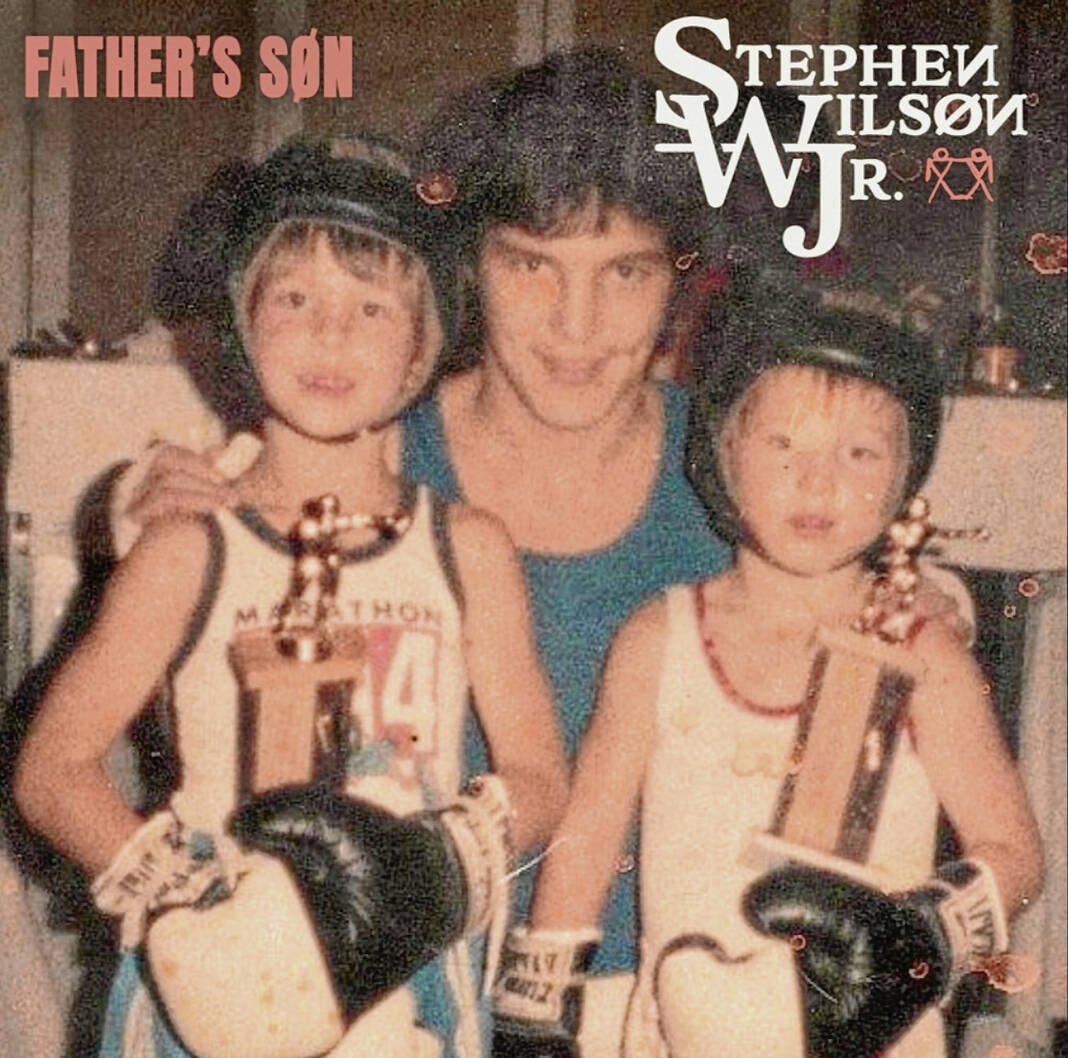
The photo shows Stephen Wilson Sr., center, with his two sons, Stephen Wilson Jr. and Nic Wilson, from their younger days of boxing. Stephen Sr. was a boxer, too. This artwork is on the cover of Stephen Jr.’s new song, “Father’s Son,” that’s a tribute to his dad.
Submitted photo
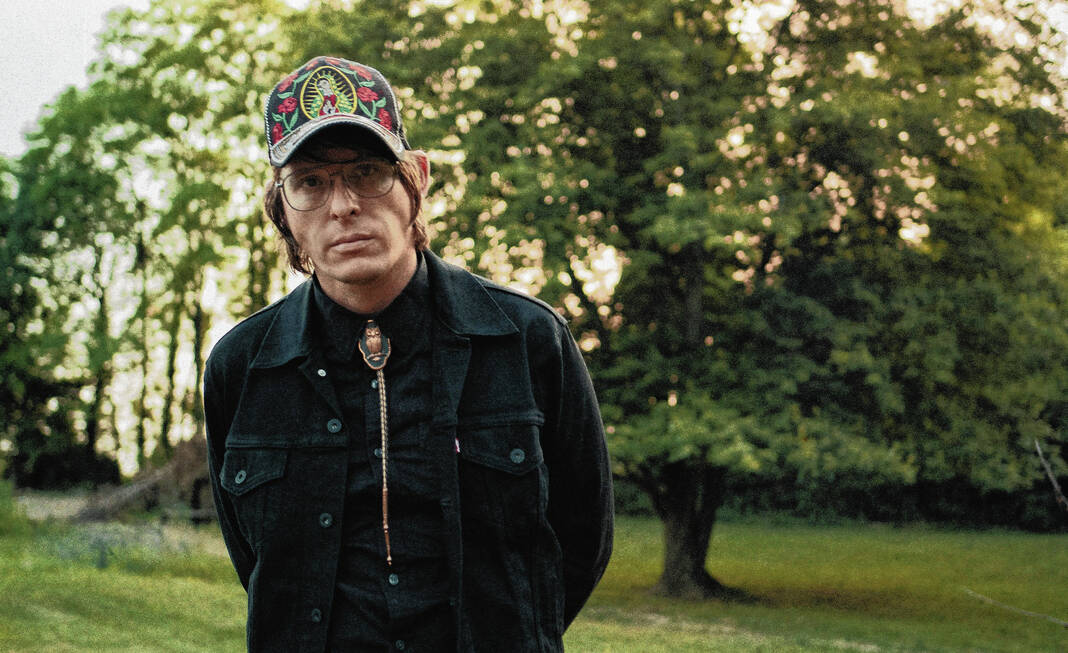
Seymour native Stephen Wilson Jr. is a Nashville, Tennessee-based singer-songwriter.
Submitted photo
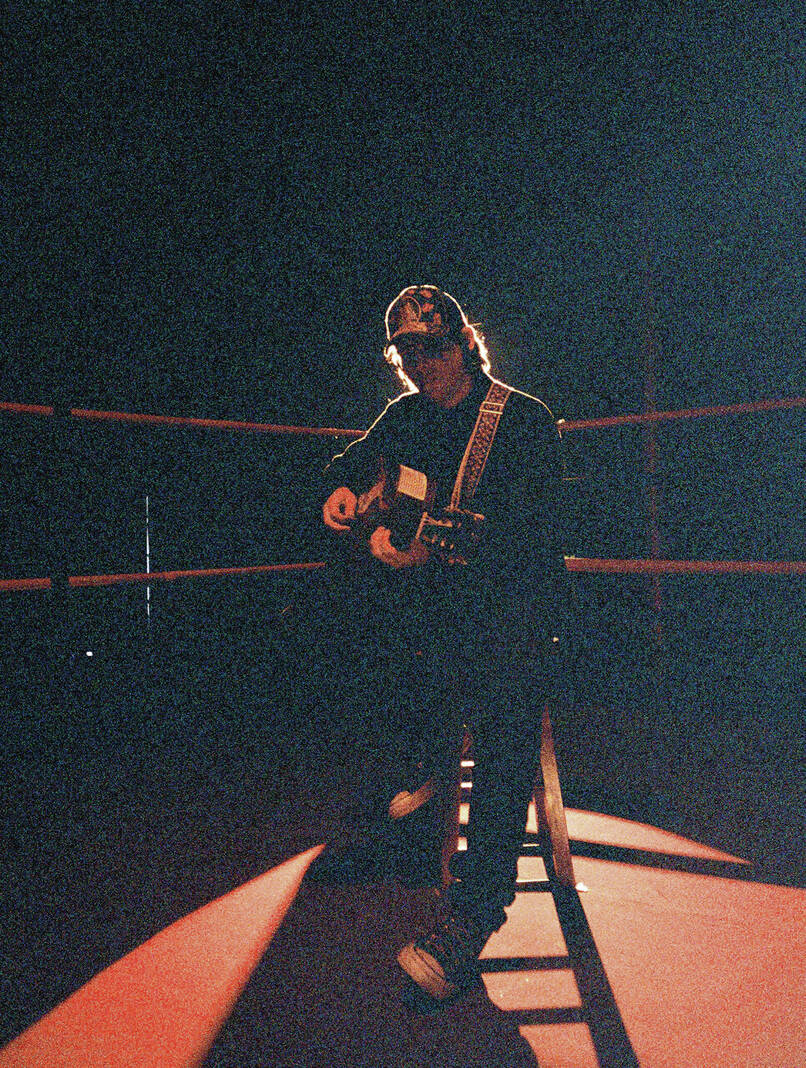
Stephen Wilson Jr. sings and plays guitar in a boxing ring while shooting the music video for his new song, “Father’s Son.”
Photo by Acacia Evans
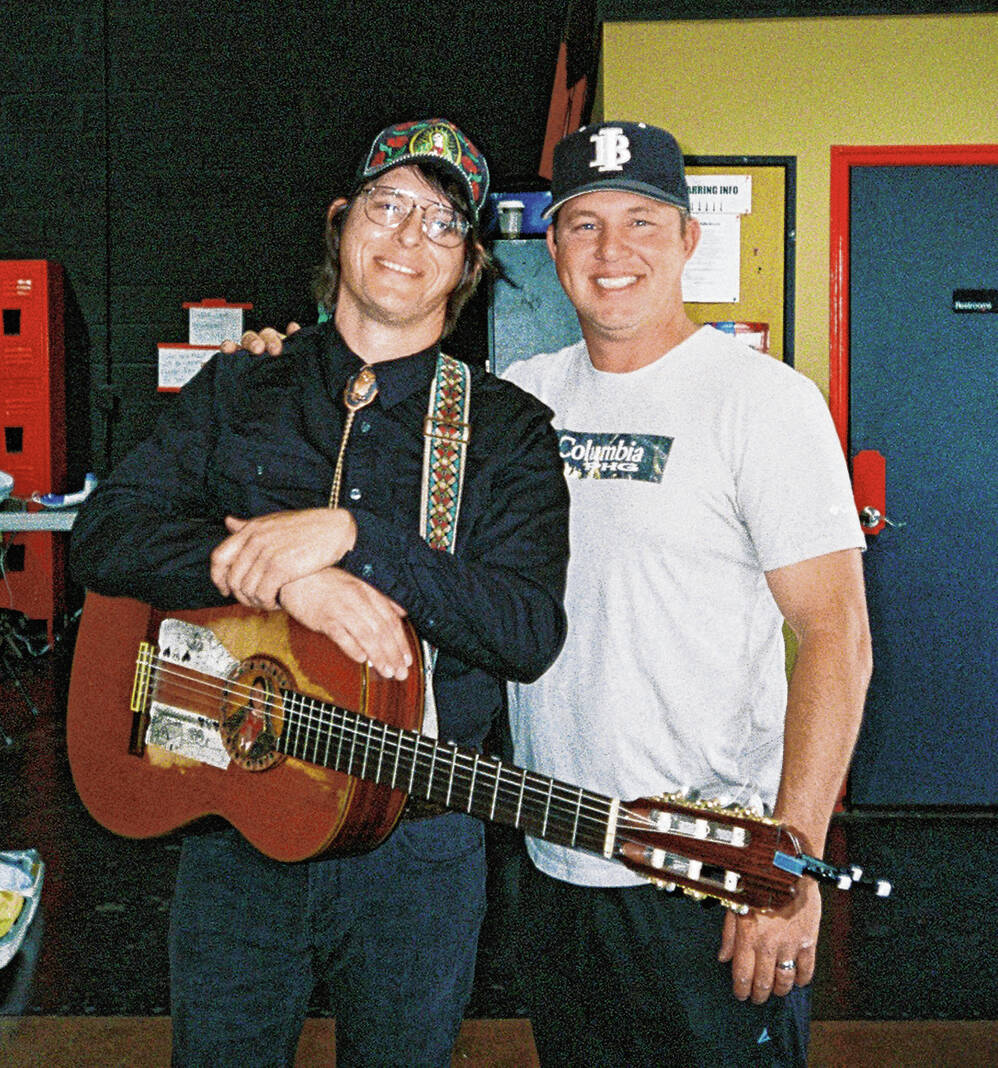
Nic Wilson, right, traveled to Nashville, Tennessee, where his brother, Stephen Wilson Jr., left, lives to be part of the filming of the music video for Stephen’s new song, “Father’s Son.”
Photo by Acacia Evans

Stephen Wilson Jr. plays during Drake White’s show in Cambridge, England, in June.
Submitted photo
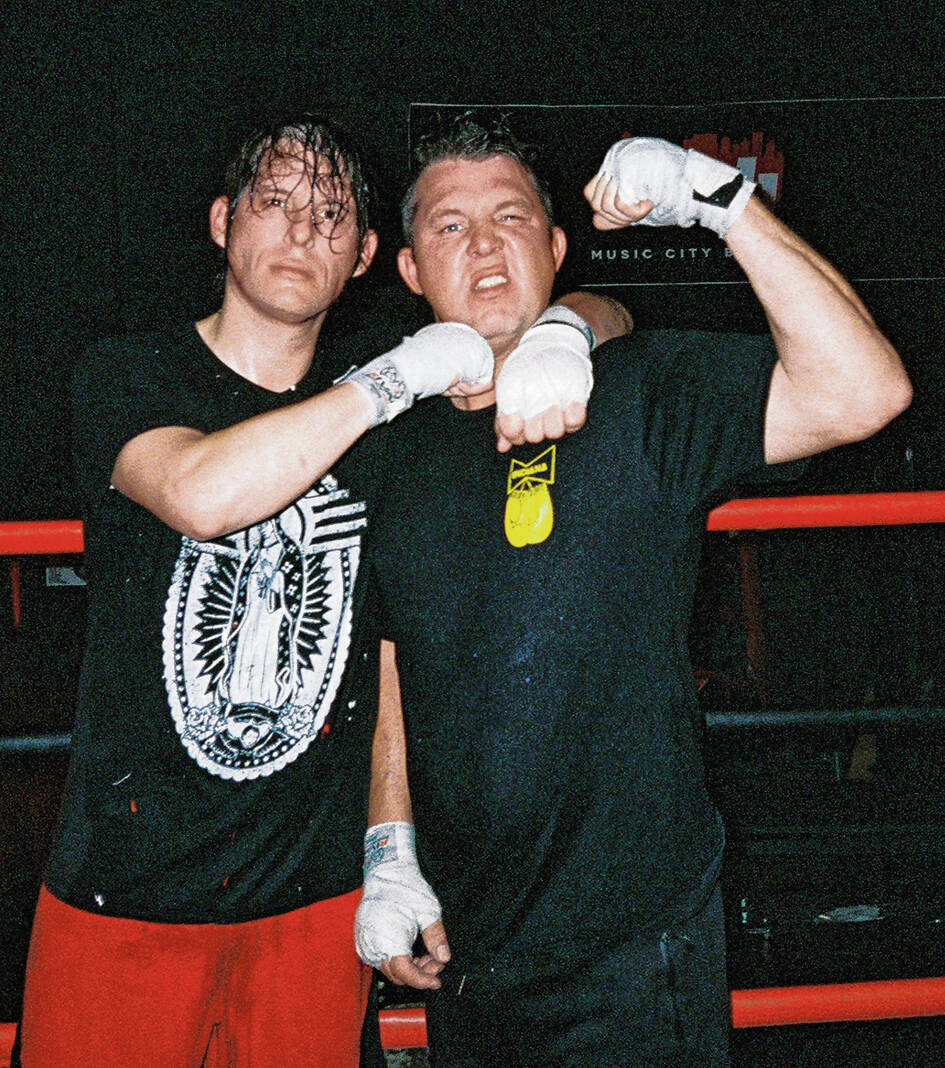
Stephen Wilson Jr., left, and his brother, Nic Wilson, grew up boxing and were back in the ring recently for the filming of the music video for Stephen’s new song, “Father’s Son.”
Photo by Acacia Evans
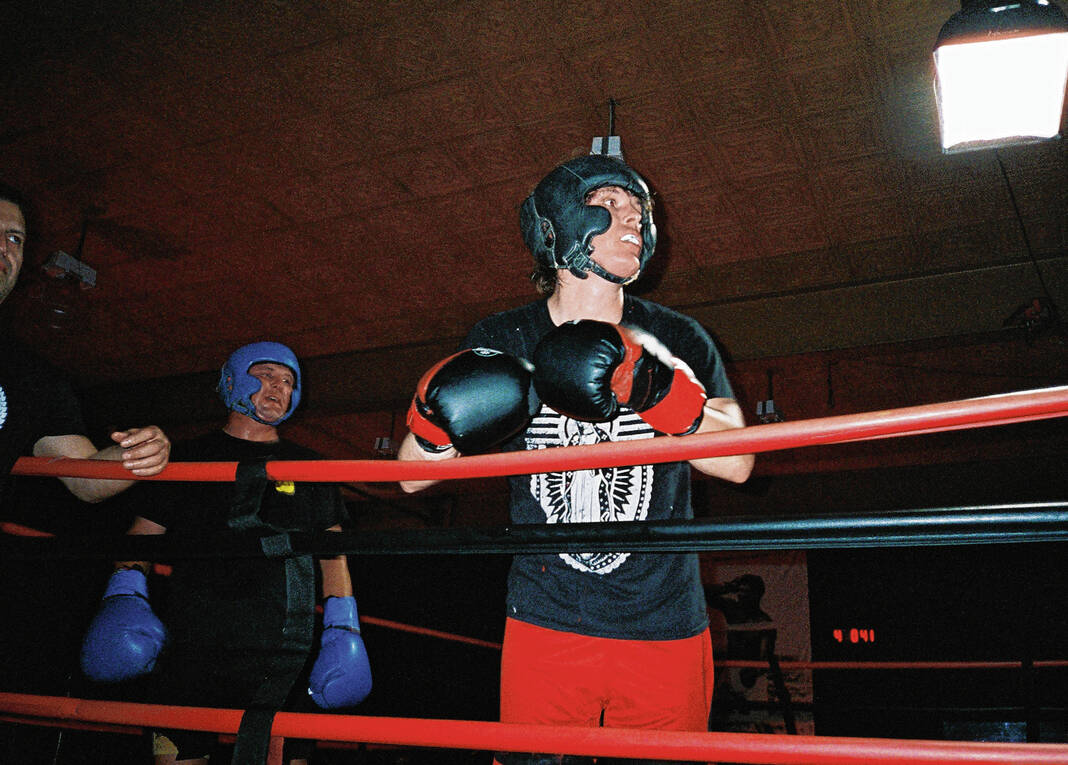
Nic Wilson, left, and his brother, Stephen Wilson Jr., take a break from boxing while filming the music video for Stephen’s new song, “Father’s Son.”
Photo by Acacia Evans
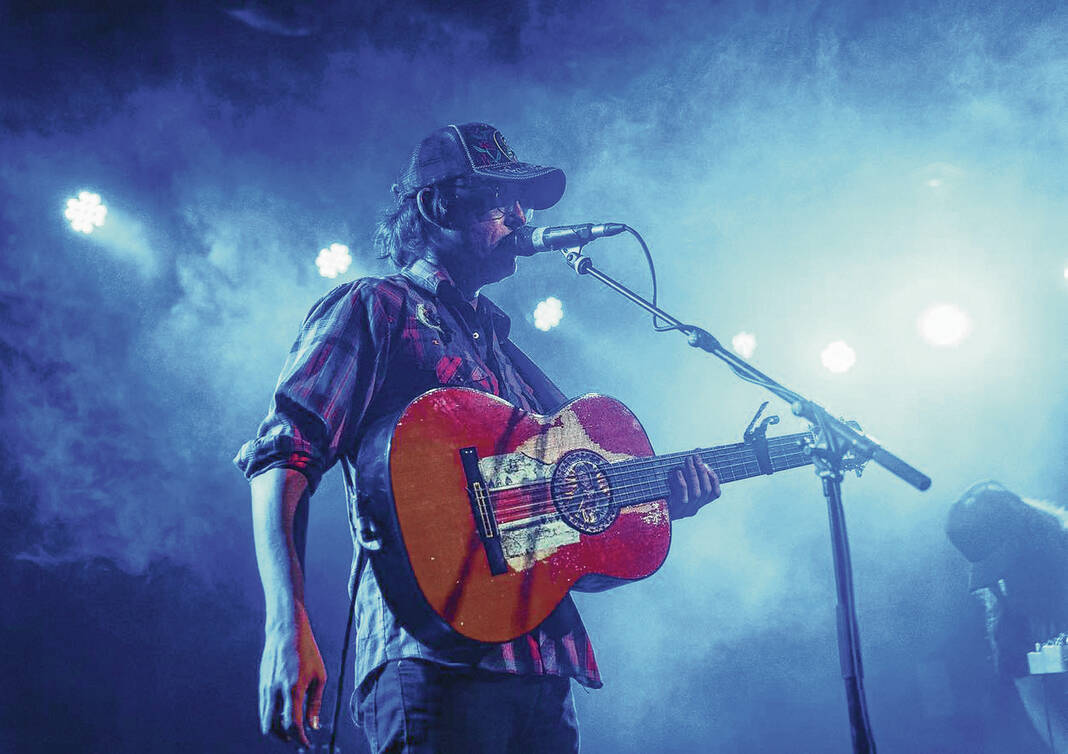
Seymour native Stephen Wilson Jr. starts every show by introducing himself with “I’m Stephen Wilson Jr., and I am my father’s son.”
Submitted photo
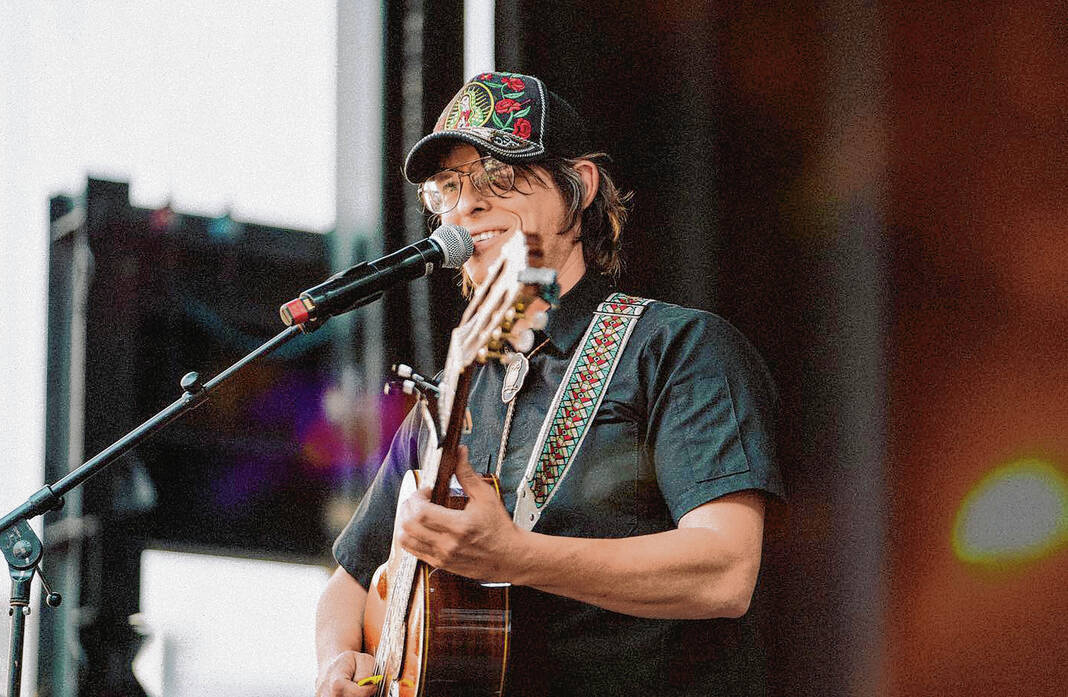
Stephen Wilson Jr. performed at CMA Fest earlier this year.
Submitted photo
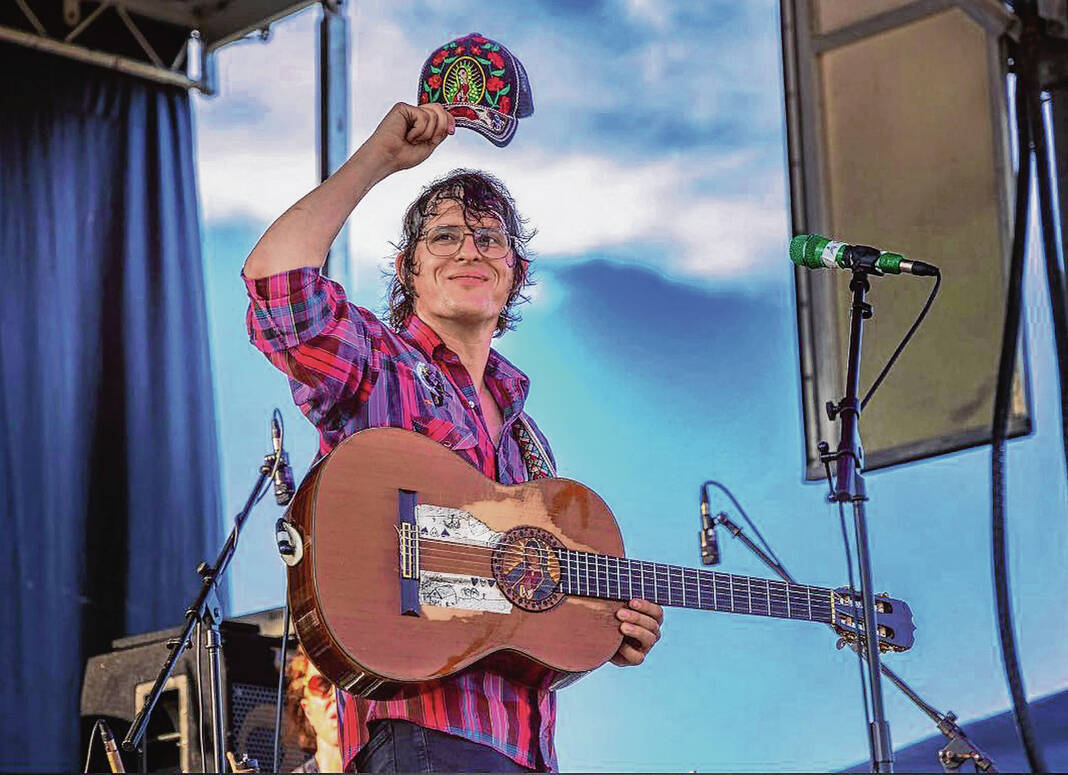
Seymour native Stephen Wilson Jr. will release his first full-length album, “søn of dad,” on Sept. 15, which will be the five-year anniversary of the death of his father, Stephen Wilson Sr.
Submitted photo
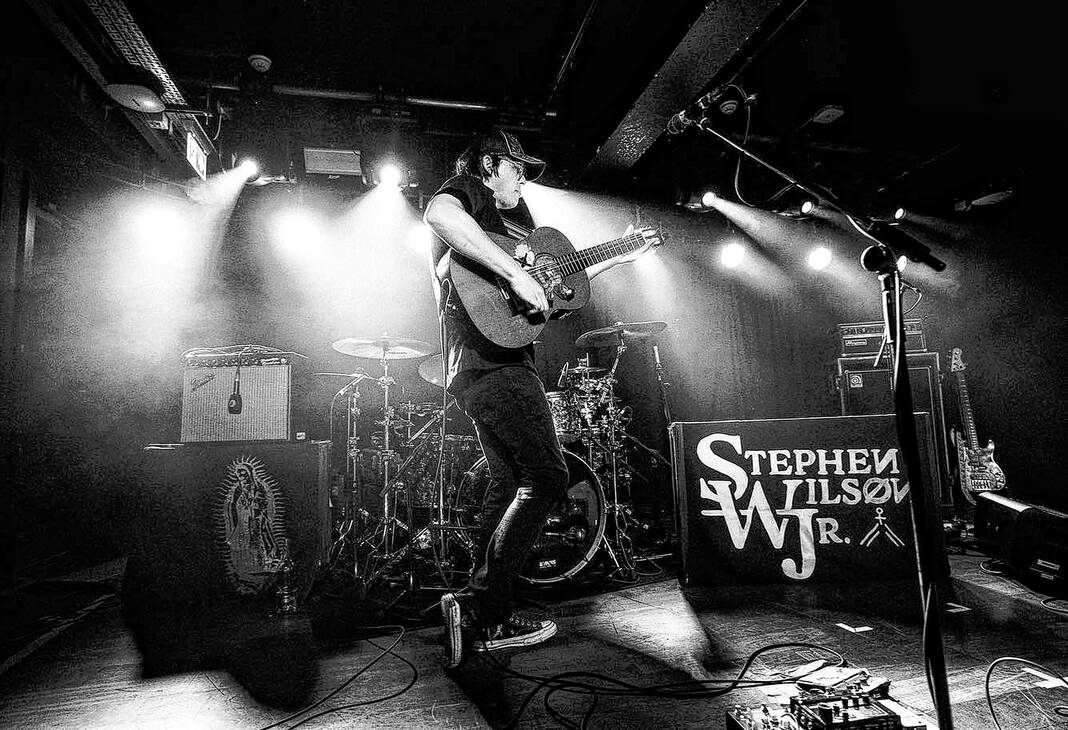
Seymour native Stephen Wilson Jr. is making a name for himself in the country music industry.
Submitted photo
At the start of every show for the past five years, singer-songwriter Stephen Wilson Jr. has introduced himself by saying, “I’m Stephen Wilson Jr., and I am my father’s son.”
He also frequently talks about his hometown of Seymour.
It’s because he’s proud of his father and his hometown.
In March, the 43-year-old Nashville, Tennessee-based artist signed to Big Loud Records and released his debut EP, “bon aqua.” The seven-song collection compiles six previously released songs and the new single, “American Gothic,” featuring Hailey Whitters.
Just recently, Wilson released his new single, “Father’s Son,” and an accompanying music video and announced his debut album, a double album titled “søn of dad,” will come out Sept. 15, which happens to be the fifth anniversary of the death of his father, Stephen Wilson Sr.
“There are a lot of songs on there about him,” Wilson said of his dad, who died Sept. 15, 2018, at age 59.
“Every song, in some way, shape or form, is probably inspired by him,” he said. “That’s the whole point of it. It’s my debut album as an artist on Big Loud Records, and they are going big with it. It’s pretty cool. I’m honored to be able to do this. For me, it’s a big way of honoring his legacy, and Seymour was his legacy. There was no more of a Seymour guy than my dad.”
Wilson recently released two other songs from the album and said another one will be released within the next month before the 22-song record comes out. He also continues to tour and will be featured in shows with Joss Stone, Larry Fleet and Midland. The day before his album release, he will perform during Bourbon & Beyond in Louisville, Kentucky.
He hopes to find a window in his schedule to do a hometown album release show in Seymour.
“Seymour has just a big part of my heart. I talk about it everywhere I go,” he said.
At its core, “søn of dad,” co-produced by Wilson and Benjamin West, is a tribute to Stephen Wilson Sr., who trained his son as a boxer from the age of 5 and was himself a two-time Indiana State Golden Gloves champion.
“Writing and making this album has been very therapeutic for me to learn who I am and what my existence looks like after my father because life has to go on,” Wilson said. “I’m living my own life, but it’s like his death bookended what life he should have had onto mine, and I’m carrying it around like a train car.”
Wilson said he wrote “Father’s Son” with Nick Wayne and Josh Kerr about three years ago via Zoom during the COVID-19 pandemic. He had the song title floating around for a couple of years but said he was too afraid to write it.
At the start of the Zoom call, he introduced himself the same way he does every show. After hearing Wilson say, “I am my father’s son,” one of them asked if he had ever written a song with that idea.
“It just kind of fell out and I didn’t fight it, even though I was with two guys I didn’t really know and it was a very personal thing,” Wilson said. “Sometimes, that’s the way you’ve got to go about it. It’s kind of like going to a psychologist or something. They are perfect strangers, and sometimes, you can speak more candidly even with them than you could yourself. That was just the way it went down. We wrote it quickly, and it was a matter of what to do with it.”
Wilson said the message of the song is about trying to find your own identity with having your father’s name.
“When he died, who I was died with him,” Wilson said. “The song is a journey of figuring out who that is and then not conceding to the fact that I am my father’s son, but I am not the same person that I was before, either.”
He said the message of the music video is different. It features old footage of he and his brother and father boxing along with memorabilia and pictures. Also, the business Stephen Sr. and Nic started, Wilson Auto Body, is featured, and the two brothers put on their boxing gloves and spar in the ring.
“The song and the whole score of it was almost like his gift. It was him preparing me for life,” Wilson said. “Whether you’re a boxer or not, you’re going to take a beating in life. I think that’s what he was just trying to teach me, like if you can do this, it might help you take the beating a little bit better and maybe get back up a little quicker.”
Part of the video was filmed at Music City Boxing in Nashville, where Stephen trains. That’s when he and his brother wrapped up like they did when they were kids.
“It was actually four good rounds of boxing, and we were really proud of it,” Wilson said. “We beat the crap out of each other but in the sweetest, funnest way possible. We had a blast doing it. I don’t know if you could tell that in the video. We were actually having such a good time. I know that’s probably not a lot of people’s idea of fun, but it was our idea of fun.”
Wilson said it was really special.
“It was like a bit of a time capsule, kind of stepping into one, kind of unearthing memories in real time,” he said. “With each punch, it would jar a new memory in my brain, each shot he hit me with. It was just a cool physical piece of nostalgia, and I’ll never forget it.”
The other part of the video was filmed at Wilson Auto Body.
“My dad’s legacy big time is that body shop, and it was everything to him,” Wilson said. “His dream was to have a backyard body shop like that. He wanted a shop that wasn’t massive but one that you can maintain and keep it close to home and a family business and all that stuff. He fulfilled his dream, his business dream.”
Wilson said he was glad to have his brother be the star of the video, and his nephews, Vince Wilson and Hunter Wilson, also are featured in it.
“I’m just so proud of him for what he has done at the shop. His work ethic is just undeniable there,” Stephen said of Nic. “He is truly like the American blue collar hero, in my opinion, really self-started, just kind of really picked himself up by his bootstraps from a very young age and has worked for everything he has. I’m just honored to have him in that.”
Wilson said he thinks his dad would be really proud of the video.
“He’s probably up there shadowboxing right now, just hitting the heavy bag in heaven. That’s what he would do when he would get excited. He would go hit a heavy bag or something,” he said. “He was big on my mind the whole time. I made the video for him. It’s very much a tribute to him.”
Looking back on his start in music, Wilson said he is grateful his father always supported that career choice.
Wilson recalled living in the Reddington area growing up and riding an hour and a half one way on the school bus and being immersed in country music because that’s all the bus driver listened to.
“I would have to say that’s when I first really kind of started listening to music seriously, really noticing that it meant more than just sounds and melodies and catchy beats and stuff,” he said. “I was really listening to the lyrics and the songwriting.”
Tim McGraw’s song “Don’t Take the Girl” made a big impression on him.
“It kind of made a mess of me on a school bus as a kid,” Wilson said. “I’ll never forget that feeling, and I was like, ‘Wow!’ because I had watched movies and stuff for 90 minutes and never had anything close to an experience like that. That was a 4-minute song. There’s some kind of wizardry going on there. That was my first real bite as a kid.”
At 16, he started playing guitar.
“My dad got me a guitar, and then he recognized I had a bit of an affinity for music,” Wilson said. “He would hear me picking out songs on those little cheap Casio keyboards at Walmart. I just kind of had an ear for it. I didn’t really have to be taught anything. He got me a guitar, and I was off to the races.”
He began writing songs as a hobby while studying microbiology and chemistry at Middle Tennessee State University.
After graduating college in 2005, he started an indie rock band, AutoVaughn. He was the lead guitar player and one of the songwriters, and they toured for five years.
“That’s when I kind of had the curtain pulled back on what possibilities were there,” Wilson said. “Because of that band, I started getting put into some of these songwriting rooms, and that’s when I started singing the patterns and had that ‘Don’t Take the Girl’ moment. I was starting to see how all of this is coming together. I was starting to see like, ‘Oh, that’s how that song got written, and that’s how all of the songs that I grew up listening to got written.’”
After the band, he worked for several years as a research and development scientist for Mars until signing a publishing deal with BMG Nashville in 2016.
“I bartended and waited tables for a couple years until I could figure out how to get a publishing deal,” he said. “This guy at BMG publishing heard one of my weird songs and signed me on the spot. It was a real godsend because I wasn’t really writing all of the bro-country stuff that was popular at the time. It was a different time for country music especially, so it was hard for me.”
Wilson spent the next couple of years developing his craft as a songwriter, and he said that accidentally turned into an artist career.
“I didn’t really see it coming. I wanted to write songs for other people,” Wilson said. “Oddly enough, one of the first people to record one of my songs was Tim McGraw. That was a full circle moment. Even though he didn’t release it, it at least let me know I was on the right path. There was a reason for that.”
Brothers Osborne, Caitlyn Smith, Trace Adkins and other artists cut Wilson’s songs, and he started to build his name as a songwriter in Nashville.
Once his dad died, he said that changed everything.
“He had a bigger-than-life approach to life, and he was like my original champion,” Wilson said. “When pretty much everybody told me I was crazy (for pursuing music), he was the only one that kept telling me I was sane. That was a huge part of my confidence, so when he was gone, it was like I didn’t really have that anymore. I had to figure out how to find it.”
He said he found it by going onstage, singing songs for people and redefining who he was.
“I think his biggest gift to me was teaching me how to box and throwing me in that ring and making me fight other people because it just set a bar so high for what I could handle after that,” Wilson said. “I dealt with a lot of stage fright and performance anxiety because I’ve always been a very shy person. Getting up onstage and being vulnerable like that, it’s a tough thing to do for a personality like mine.”
This year, he has opened for a myriad of artists and spent a lot of time introducing himself. He also made Grand Ole Opry and Stagecoach debuts and his first CMA Fest performance.
The plan is to become a headliner. He has the “Bluebird to Bridgestone” mentality.
The Bluebird Cafe in Nashville is a small, classic writers room where Wilson played his first show as an artist, and Bridgestone Arena in Nashville seats 20,000 people for a concert.
“This is like a slow process,” Wilson said. “You’ve got to be real patient and work, building blocks.”
